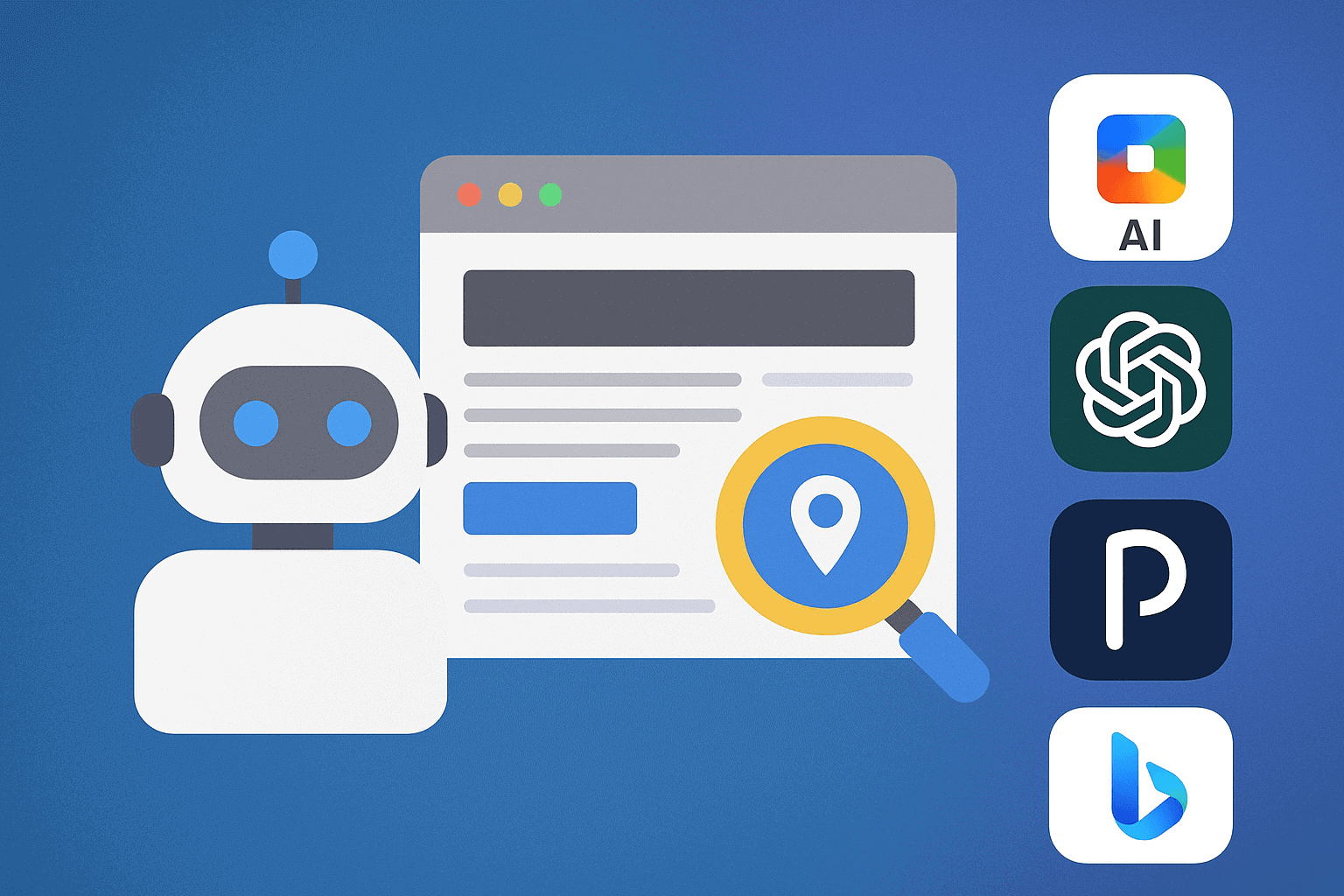Search is no longer what it used to be. In the past, SEO focused on ranking pages in Google’s top 10 results. But today, AI-powered search engines like Google’s AI Overviews, ChatGPT, Perplexity, and Bing Copilot don’t just list links — they summarize, cite, and recommend. This shift means that simply optimizing for keywords isn’t enough anymore.
This is where GEO SEO (Generative Engine Optimization) comes in — the next evolution of SEO designed to help websites get mentioned, cited, and trusted inside AI-driven answers. And to measure how ready your site is for this new era, you need a GEO Audit.
In this guide, you’ll learn:
- What GEO SEO is and why it matters in 2025.
- What a GEO Audit involves and how it’s different from a traditional SEO audit.
- Step-by-step strategies you can apply to make your website AI-ready.
- Practical examples and checklists so both business owners and digital marketing professionals can take action right away.
By the end, you’ll not only understand GEO SEO, but also have a clear roadmap to ensure your website is future-proof for AI search and generative engines.
What is GEO SEO?
GEO SEO, or Generative Engine Optimization, is the process of optimizing your website and content so that AI-powered search engines — like Google’s AI Overviews, ChatGPT, Perplexity, and Bing Copilot — can easily understand, cite, and recommend your brand in their generated answers.
Unlike traditional SEO, which focuses on ranking in Google’s search results, GEO SEO is about earning visibility inside AI-driven responses. Instead of just chasing keywords, it emphasizes:
- Citation readiness → adding data, sources, and credibility.
- Entity optimization → making sure brands, people, and services are clearly defined.
- Structured content → FAQ sections, schema markup, and knowledge graph alignment.
In other words, GEO SEO helps websites move from being “ranked” to being “referenced” by AI models.
What is a GEO Audit?
A GEO Audit is a website evaluation that measures how ready your content, structure, and authority are to be cited, referenced, and recommended by AI-powered search engines such as Google’s AI Overviews, ChatGPT, Perplexity, and Bing Copilot.
While a traditional SEO audit focuses on keywords, crawlability, backlinks, and rankings, a GEO Audit goes deeper. It assesses whether your website can be trusted and understood by large language models (LLMs) and generative engines. The key difference is that SEO audits aim for search rankings, while GEO audits aim for AI citations.
Core Elements of a GEO Audit
- Citation Readiness
- Does your content include verifiable data, statistics, and credible external sources?
- Is it “cite-worthy” for AI models?
- Answer Alignment
- Does your content directly answer common industry and user questions?
- Is it structured in a way that aligns with People Also Ask and AI Overviews?
- Knowledge Graph Optimization
- Are your brand, services, and entities clearly defined and consistent across the web?
- Do you use schema markup to connect your content to recognized entities?
- Content Authority
- Does your site demonstrate expertise, experience, and trustworthiness (E-E-A-T)?
- Do you provide original insights, case studies, and testimonials?
- Technical Accessibility
- Is your site fast, mobile-friendly, and fully crawlable?
- Is structured data properly implemented and validated?
- Competitive Positioning
- Does your content stand out from competitors?
- Are you building mentions, backlinks, and brand signals strong enough to influence AI recommendations?

Why is GEO Important in 2025?
The way people search online has changed dramatically. AI-driven search engines like Google’s Search Generative Experience (SGE), Perplexity, ChatGPT, and Bing Copilot are no longer just showing a list of blue links. Instead, they summarize answers, cite trusted sources, and recommend brands directly inside their responses.
This shift creates a new challenge — and a new opportunity. If your website isn’t optimized for GEO SEO, it risks being invisible in the very places where users are now getting their answers. But if you adopt GEO early, your brand can earn citations, mentions, and authority inside AI-powered results.
Here’s why GEO matters in 2025:
- Be cited in AI answers → Your content becomes a trusted source that generative engines pull from.
- Gain brand mentions & authority → When AI cites you, users perceive your business as credible and authoritative.
- Future-proof your SEO strategy → Traditional SEO rankings are no longer enough; GEO ensures you remain visible as search evolves.
- Capture opportunities competitors miss → Businesses that adopt GEO today will enjoy first-mover visibility, while others scramble to catch up.
For clients, this means your brand doesn’t just rank — it gets recommended by AI.
For SEO and digital marketing experts, it means shifting strategies from ranking keywords to training AI models to trust your content.
In short: 2025 is the year GEO moves from optional to essential.
GEO SEO vs AEO vs Traditional SEO
Search optimization has evolved through several stages. To understand where GEO SEO fits, it helps to compare it with traditional SEO and AEO (Answer Engine Optimization).
- Traditional SEO focuses on ranking web pages in search engines like Google through keywords, backlinks, and technical optimization.
- AEO (Answer Engine Optimization) focuses on winning quick, direct answers, featured snippets, and voice search.
- GEO SEO (Generative Engine Optimization) goes further by optimizing content to be cited, trusted, and recommended by AI-powered engines such as Google SGE, ChatGPT, and Perplexity.
|
Approach |
Primary Focus |
Goal |
Example in Action |
|
Traditional SEO |
Keywords, backlinks, technical SEO |
Rank in Google’s top 10 search results |
Ranking #1 for “SEO consultant in Bangladesh” |
|
AEO (Answer Engine Optimization) |
Snippet optimization, FAQ content |
Capture featured snippets, People Also Ask, and voice answers |
Appearing in Google’s “What is SEO?” PAA box |
|
GEO SEO (Generative Engine Optimization) |
Citation readiness, entity optimization, authority |
Be cited and recommended by AI-driven search engines |
ChatGPT or Perplexity citing your blog in their answer to “What is GEO SEO?” |
How to Implement GEO SEO (Step-by-Step Guide)
If you want your content to surface in AI search engines, you need a structured, systematic approach. Here’s a practical framework you can follow:
1. Run a GEO Audit
Start by assessing your baseline readiness for Generative Engine Optimization (GEO). This includes checking whether your site is crawlable, if your entities are properly defined, and whether your content is structured in a way AI systems can interpret. A GEO audit will give you a “readiness score” and highlight gaps you need to fix.
2. Optimize Citations
Enhance your content with supporting evidence. Use reliable statistics, reference authoritative sources, and add outbound links where relevant. These signals help AI models verify the accuracy of your content and increase its likelihood of being featured in answers.
- Add external links to authoritative sources like industry reports, research studies, or recognized SEO publications.
- Use internal linking to connect relevant pages and case studies.
- The goal: make your content cite-worthy for AI models.
3. Add FAQ Sections
Identify common People Also Ask (PAA) queries and AI Overview questions in your niche. Then, create FAQ sections on your pages to directly address these. Concise, structured Q&A content is highly favored by AI engines and improves chances of being quoted.
- Answer questions clearly and concisely (40–60 words per answer).
- Cover both basic questions for clients and technical questions for SEO pros.
- Example: “What is a GEO Audit?” → Direct answer, then expand with context.
4. Implement Schema Markup
Add structured data to make your content machine-readable. Key schema types include:
- FAQ schema – helps FAQs appear in AI and SERP results.
- Person schema – reinforces author credibility.
- LocalBusiness schema – establishes location relevance.
- Service schema – clarifies what you offer.
This markup makes your site easier for AI search engines to understand and rank.
5. Entity Optimization
Ensure your business name, services, and key entities are consistent across the web. Align them with recognized Knowledge Graph entries when possible. This boosts trust signals and strengthens your authority within AI-generated results.
Align your brand, service names, and terminology consistently across:
- Your website
- LinkedIn, Google Business Profile, and other platforms
- Case studies and client mentions
This helps AI engines recognize your brand and link entities correctly.
6. Build Authority
AI search rewards authoritative content. Collect mentions in trusted publications, publish case studies, and showcase client testimonials. The more third-party validation your brand has, the more credible you’ll appear to generative systems.
Increase your website’s credibility by:
- Publishing original case studies and research insights
- Collecting client testimonials
- Gaining mentions from authoritative websites
- Earning backlinks from relevant industry sites
AI models are more likely to cite trusted and authoritative sources.
7. Technical Cleanup
Finally, don’t overlook technical SEO. Improve Core Web Vitals, fix crawl errors, and maintain a clean site structure. Well-optimized, fast-loading, and structured pages give AI systems confidence in surfacing your content.
Ensure your website is fully optimized for AI and human users alike:
- Core Web Vitals → page speed, layout stability, interactivity
- Crawlability → all content accessible to search engines
- Structured content → clear headings, bullet points, tables for better AI comprehension
GEO Audit Checklist
Before diving deep into GEO SEO, it’s smart to evaluate where your site currently stands. Use this checklist to measure readiness for Generative Engine Optimization. It works both as a client-friendly scorecard and a pro-level audit tool.
✅ Does your site provide data-backed answers?
AI engines prefer content that’s supported by facts, stats, and references—not just opinions. Make sure key pages cite data that reinforces your expertise.
✅ Do you cite credible external sources?
Outbound links to trusted publications, government data, or industry reports signal authority. These citations give AI systems confidence in using your content for answers.
✅ Do you use FAQ schema?
FAQ markup helps AI models and search engines instantly recognize question-and-answer content. This improves your chances of being featured in People Also Ask boxes and AI Overviews.
✅ Are your entities (brand, services, location) consistent across the web?
Check your Google Business Profile, citations, and website content. Consistency in naming and descriptions helps AI engines align your business with Knowledge Graph entries.
✅ Do you have backlinks/mentions from authority sites?
High-quality mentions in reputable sources strengthen credibility. AI engines look at brand authority just like traditional SEO does.
✅ Does your site pass Core Web Vitals & accessibility tests?
Page speed, mobile responsiveness, and accessibility all impact visibility. If your site underperforms technically, AI systems may be less likely to surface it.
Tip for Businesses: Even small improvements in these areas can make a big difference in how AI engines perceive your website, increasing the chances that your brand will be cited and recommended.
Tip for SEO Professionals: Use this checklist as a baseline for ongoing GEO SEO audits, ensuring your clients’ websites remain future-proofed for AI search.

FAQ's
A GEO audit reviews your website’s readiness for Generative Engine Optimization. It checks if your content is structured, data-backed, and entity-aligned so AI search engines can understand and feature it. The audit highlights gaps in schema, citations, authority, and technical SEO.
GEO (Generative Engine Optimization) is the process of optimizing your website for AI-driven search engines. Unlike traditional SEO, which targets rankings on Google’s SERPs, GEO ensures your content is machine-readable, credible, and contextually accurate so it can appear in AI-generated answers and summaries.
SEO focuses on ranking pages in search engines, while AEO (Answer Engine Optimization) targets direct answers in search snippets. GEO (Generative Engine Optimization) goes further—optimizing for AI models like ChatGPT, Gemini, or Perplexity—ensuring your brand and content are included in conversational, generative responses.
A GEO SEO Audit Tool analyzes your website’s readiness for AI search engines. It checks schema, entities, authority signals, and technical SEO to see if your site is AI-friendly. The tool provides a readiness score and recommendations to improve visibility in Google’s AI Overviews, ChatGPT, Perplexity, and Bing Copilot.
A GEO SEO consultant helps businesses optimize their websites for AI-driven search engines like Google’s AI Overviews, ChatGPT, Perplexity, and Bing Copilot. They conduct audits, implement schema, align entities, and build authority so content is AI-ready and more likely to be cited in generative results.
A regular SEO consultant focuses on rankings in Google SERPs, while a GEO SEO consultant specializes in optimizing for AI-driven platforms. This includes entity alignment, schema markup, and AI citation readiness—ensuring your content appears in both search results and AI-generated responses.
A GEO SEO consultant typically offers:
-
GEO SEO audits
-
Schema & structured data implementation
-
Entity and Knowledge Graph optimization
-
AI citation and authority-building strategies
-
Technical SEO cleanup for AI readiness
No—GEO doesn’t replace SEO but builds on it. Traditional SEO is still essential for visibility on search engines, but GEO adds another layer for AI search. Together, they ensure your content ranks in SERPs and also appears in AI-driven summaries, chatbots, and knowledge answers.
To implement GEO SEO, start with a GEO audit, optimize citations with data and outbound links, add FAQ sections, implement schema markup, ensure entity consistency, build authority with mentions and case studies, and clean up technical SEO. This framework makes your content AI-friendly and trustworthy.
AI search is growing fast, and websites not optimized for generative engines risk losing visibility. A GEO audit ensures your site is prepared—checking schema, authority, technical SEO, and entity consistency—so your content is eligible to appear in AI Overviews and conversational search results.
Several GEO SEO audit tools help assess your website’s AI readiness. Popular options include Mangools AI Search Grader, KAI Footprint, HubSpot AI Search Grader, LLMrefs, Geoptie, SEOmator, Seobility, and Addlly AI. These tools check visibility in AI engines, schema usage, entity consistency, authority signals, and technical performance to improve AI-driven search results.
AI search is changing how users find information. A GEO SEO expert ensures your business is visible, citable, and trusted in AI-generated answers. Without proper GEO optimization, your brand risks being overlooked in conversational search results, even if your site ranks well in traditional SEO.
If you want your business to stay ahead of competitors in 2025 and beyond, now is the time. As AI search engines expand, a GEO SEO expert ensures your content is future-proof, AI-friendly, and consistently included in generative results.
To rank first on AI search engines like ChatGPT, focus on GEO SEO strategies: provide data-backed answers, use schema markup, optimize entities for Knowledge Graph alignment, and build authority with credible mentions. Adding FAQs, structured content, and ensuring Core Web Vitals compliance all increase your chances of being cited in AI results.
Future-Proof Your Website with GEO SEO
The rise of AI-powered search engines, generative engines, and LLM-driven platforms is reshaping how websites gain visibility. Traditional SEO is no longer enough — your content must be AI-ready, cite-worthy, and structured to be referenced and recommended.
By implementing GEO SEO strategies and performing a comprehensive GEO Audit, you ensure your website remains authoritative, trustworthy, and visible in AI Overviews, People Also Ask, and generative search results.
How I Can Help
I’m Ashik Jibon, an SEO Consultant and SEO Specialist with expertise in AIO, AEO, GEO SEO, AI SEO, and LLM SEO audits. I help businesses and professionals:
- Optimize their websites for AI-driven citations and recommendations.
- Conduct full GEO SEO audits to identify and fix gaps in AI readiness.
- Implement structured content, schema, entity alignment, and authority-building strategies.
Need a free GEO SEO audit?
Get in touch today to see how your website can become AI-ready, citable, and future-proofed for 2025 and beyond.
📩 Contact me now to claim your free GEO SEO audit!




